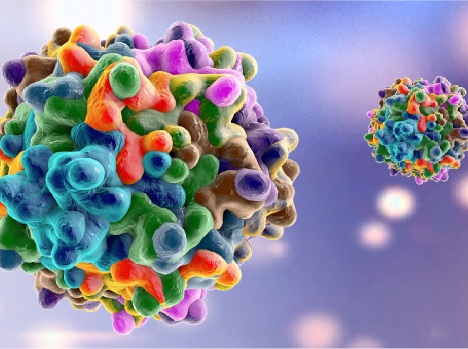Over the past decade, CAR-T cell therapy, a form of cancer immunotherapy, has shown significant promise, largely due to advances in gene delivery methods. Adeno-associated virus (AAV), particularly AAV6, is notable for its high affinity to immune cells, but its application is limited by the need for high viral loads of cell-penetrating peptides (CPPs) for effective T cell modification. A recent paper published in The Journal of Gene Medicine by Dr. Amine Kamen’s group at McGill University highlights the potential of cell-penetrating peptides (CPPs) in overcoming this limitation. TAT-HA2 and LAH4, two tested CPPs, have been shown to significantly enhance AAV6 transduction into T cells. These positively charged peptides increase transduction by concentrating viral particles on the cell surface. Notably, lower concentrations of these CPPs were effective in improving transducibility, while higher concentrations were found to cause cellular toxicity. Combining these peptides did not yield further improvement.
The research demonstrated that pre-incubating AAV6 with CPPs like TAT-HA2 and LAH4 led to a significant increase in transduction efficiency. TAT-HA2 assists in cell membrane translocation, and LAH4 binds to plasma membranes, both contributing to the improved release of AAV particles from endosomes. Microscopy analysis supported these findings, showing an increased uptake of AAV6-LAH4 complexes in T cells. The study posits that LAH4 might enhance transduction by stimulating nuclear trafficking or promoting cargo release, while TAT-HA2 is likely to aid in endosomal escape.
Interestingly, the study found that the large size of AAV6-LAH4 complexes, which might suggest the involvement of macropinocytosis, did not play a significant role in the transduction process. The increased transduction efficiency seems to be related to the ability of CPPs to deposit viral vectors near the cell membrane through electrostatic interactions. Importantly, the immune response to AAV vectors complexed with CPPs appeared unchanged, suggesting that CPPs do not intensify the host cell immune response and supporting their potential for safe use in gene therapies.
The study detailed above underscores the effectiveness of a 30-minute pre-incubation with cell-penetrating peptides (CPPs) in enhancing AAV6-mediated transgene delivery into T cells, which represents a significant stride in cellular immunotherapy. This method, focusing on CPPs like TAT-HA2 and LAH4, offers an efficient way to concentrate viral particles on the cell surface, thereby improving transduction without exacerbating the host cell immune response. It opens up new possibilities in developing novel cellular immunotherapies reliant on AAV6-mediated gene delivery.
Building upon this advancement, an alternative and potentially complementary approach is being explored to further optimize gene delivery. This involves engineering a modified AAV6 with enhanced infectivity. PackGene, leveraging its π-icosa capsid engineering platform, has identified several AAV6 capsid variants that exhibit a tenfold improvement in infecting human primary T cells. These promising developments are still undergoing further characterization to fully understand their potential and applicability in gene therapy. To discover more about this cutting-edge research and the ongoing progress in AAV6 capsid variant development, you are encouraged to visit PackGene’s website for detailed information and updates.

Check out our AAV capsid engineering service to expedite your gene therapy research
Reference:
Enhancement of adeno-associated virus serotype 6 transduction into T cells with cell-penetrating peptides. Moço, P.D., Dash, S., Kamen A. A., J Gene Med. 2023 Nov 13. https://doi.org/10.1002/jgm.3627
PackGene Biotech is a world-leading CRO and CDMO, excelling in AAV vectors, mRNA, plasmid DNA, and lentiviral vector solutions. Our comprehensive offerings span from vector design and construction to AAV, lentivirus, and mRNA services. With a sharp focus on early-stage drug discovery, preclinical development, and cell and gene therapy trials, we deliver cost-effective, dependable, and scalable production solutions. Leveraging our groundbreaking π-alpha 293 AAV high-yield platform, we amplify AAV production by up to 10-fold, yielding up to 1e+17vg per batch to meet diverse commercial and clinical project needs. Moreover, our tailored mRNA and LNP products and services cater to every stage of drug and vaccine development, from research to GMP production, providing a seamless, end-to-end solution.
Related News
Exploring Tau Protein’s Role in Glaucoma: New Insights and Therapeutic Potential
Glaucoma, a chronic neurodegenerative disorder, leads to irreversible vision loss by damaging retinal ganglion cells (RGCs) and the optic nerve, often associated with increased intraocular pressure (IOP). Despite the benefits of IOP-lowering treatments, the underlying...
FDA-mandated CAR-T monitoring period could be halved, say researchers
In patients with diffuse large B-cell non-Hodgkin lymphoma (DLBCL), the two hallmark post-chimeric antigen receptor (CAR)-T therapy toxicities are extremely rare after two weeks, supporting a shorter, more flexible toxicity monitoring period, according to a study...
Ancestral CRISPR-Cas13 Ribonucleases Discovered: Implications for Genome Editing
In a pioneering study published in *Science*, a team of researchers led by Peter H. Yoon and Jennifer A. Doudna from the University of California, Berkeley, has made a remarkable discovery in the realm of CRISPR technology. The team has identified an ancestral clade...
KBI Biopharma Expands Manufacturing Contract with Global Pharmaceutical Company
KBI Biopharma Inc., a JSR Life Sciences company and global cGMP contract development and manufacturing organization (CDMO), has extended and expanded its manufacturing contract with a leading global pharmaceutical company. Originally initiated in 2020, the renewed...
Related Services

